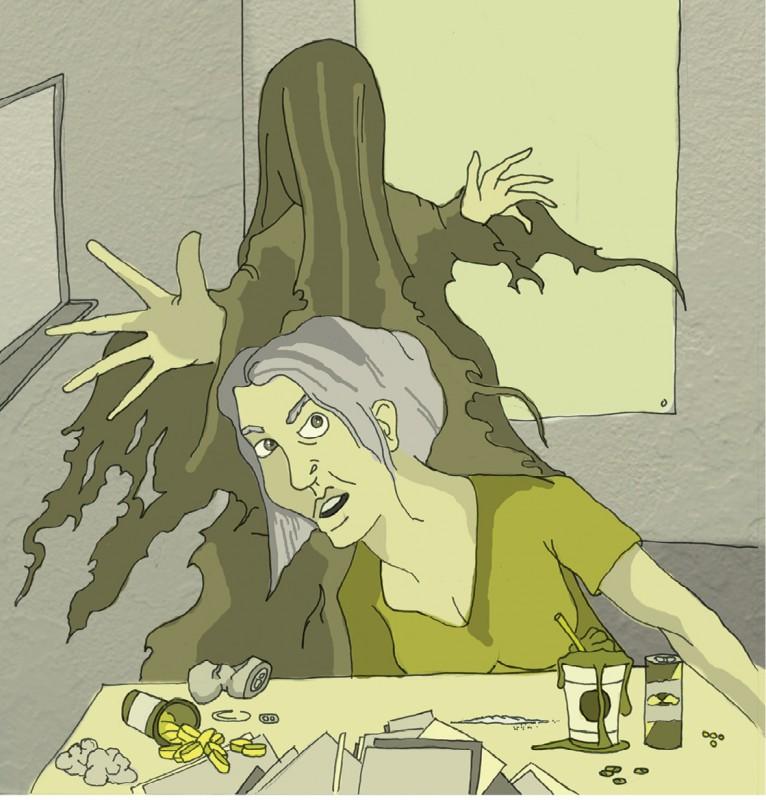
It’s Starbucks’ busiest week, there’s barely a place left to sit in the library and every student seems to be tearing his or her hair out.
It’s final exam week.
Final exams are supposedly way to see how students have grasped the concepts of a course. But finals aren’t testing a student’s comprehension: They’re testing a student’s ability to cram. Because of this, study drugs, coffee, energy drinks and swearing away sleep combine to form a cocktail of unhealthiness.
Research shows the “cram and never sleep” method is less than beneficial.
While we may think of sleep as purely a physical need, it is also an opportunity for our brains to process all the information gathered throughout the day, said Helene Emsellem, director of The Center for Sleep and Wake Disorders.
“What we learned is that when kids cram, particularly at the expense of sleep, the next day they’re more likely to have academic problems even though they spent more time studying that night,” UCLA researcher Andrew Fuligni said.
Lack of sleep isn’t the only health concern. The use of unprescribed study drugs more than doubled among college students from 1993 to 2001, according to BU Today.
While study drugs such as Adderall and Ritalin may cause increased concentration for short periods of time, students will likely crash after the drugs’ effects have worn off, causing exhaustion and depression, said University of North Carolina’s alcohol and drug specialist Nathalie Rich.
Adderall can also cause hallucinations, insomnia and paranoia, according to the National Institute of Drug Abuse.
But it isn’t just illegal substances that put a strain on your health. Everyday staples, such as coffee and energy drinks, bring their own risks when used in excess.
Energy drinks can negatively affect blood pressure and heart rhythms. They can contain three times more caffeine than a cup of coffee, according to the Huffington Post. Caffeine in excess can cause dehydration and long-term anxiety issues.
Hard to believe? The number of emergency room visits directly related to energy-drink consumption has doubled over the past four years to 20,000, according to KTVB.
Health reasons aside, final exams go against everything the academic world preaches. Professors often say, “don’t memorize — understand,” but final exams encourage otherwise.
Final exams take place in a hurried environment for both students and professors. Professors only have a few days to grade exams, so complicated concepts are cut down to simple multiple choice questions. Students have multiple exams to prepare for within a short period of time. Each exam typically accounts for a high percentage of their final grade. There aren’t enough hours in the day to understand all the concepts on every exam. Short-term memorization seems to be the only way out.
Even the phrase “study for your exam” can be harmful, according to the Chronicles of Education. The way it’s phrased suggests studying should be motivated by a one-time event. Students shouldn’t be studying just to conquer 100 multiple-choice questions, they should be studying to develop a way of thinking.
Students who have been doing well the entire semester shouldn’t be retested on information they’ve already proven they understand. And students who have been slacking off all semester, but still manage to pass the final, are usually more the byproduct of an intense all-nighter than a reflection of what they have learned.
Some schools have already taken the initiative in cutting down on final exams. Less than one fourth of Harvard University’s undergraduate courses administered final exams in spring 2010, according to Harvard Magazine. As of May 2010, professors who want to give a final exam have to inform the Registrar’s office by the first week of class. If a professor doesn’t do so, the class will not be subjected to a three-hour exam at the end of the term, according to Harvard Magazine.
Final exams don’t seem to be doing favors for anyone. Learning shouldn’t encourage unhealthy habits or go against the intentions of academics, and those are side effects caused by taking final exams.
Email Noor Ashouri at reporter10@unfspinnaker.com







